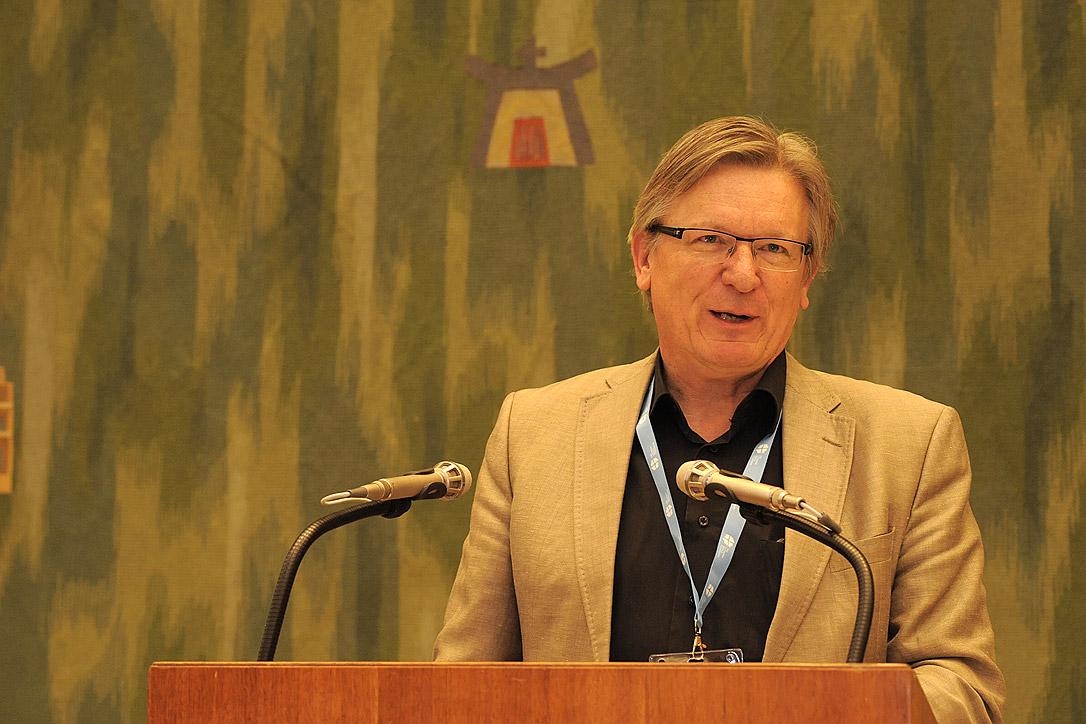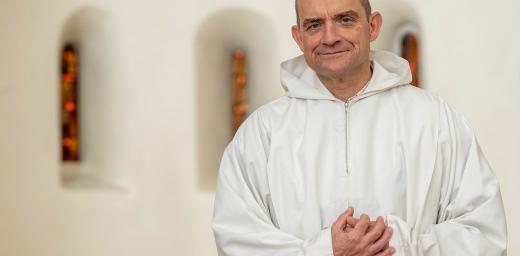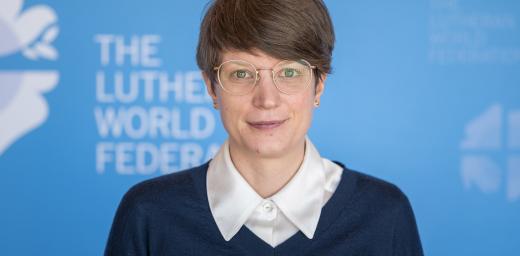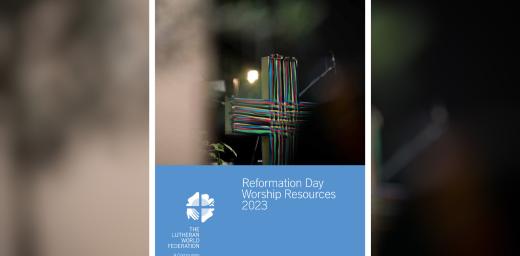Continue ecumenical engagement “in hope” – LWF partners

Dr Henk Stenvers, Mennonite World Conference Europe representative, greets the LWF Council at its June 2015 meeting in Geneva. Photo: LWF/Helen Putsma
Christian World Communions and ecumenical partners greet LWF Council
GENEVA, 26 June 2015 (LWI) – Ecumenical partners have encouraged The Lutheran World Federation (LWF) to continue “in hope” processes that deepen mutual dialogue for the sake of justice, peace and reconciliation in the world.
Representatives of Christian World Communions and ecumenical bodies greeting the LWF Council at its recent meeting in Geneva offered reflections on this year’s theme, “Hope does not disappoint.”
Monsignor Dr Matthias Türk, representing the Pontifical Council for Promoting Christian Unity, said the ecumenical landscape that includes more than 50 years of dialogue between Roman Catholics and Lutherans had altered, creating a foundation for spiritual communion.
“Today we note a fundamental transformation of what used to be rigid frontlines between churches and communities of opposing confessions. Despite continuing differences in various questions of faith, our life as ecumenical partners is characterized by cooperation in all possible ways,” he said.
Türk affirmed cooperation between both partners for a shared commemoration of the 500th anniversary of the Reformation in 2017. “Lutherans and Catholics will for the first time be able to experience a joint ecumenical experience, not in the form of a triumphal celebration, but as a confession of our shared faith in the Triune God,” Turk remarked.
The relationship between Anglicans and Lutherans has grown into a communion of love and trust that includes the giving and receiving of gifts, said Rev. Canon Dr John Gibaut, director for Unity, Faith and Order at the Anglican Communion.
Challenges and opportunities
“Many of the blessings, challenges and opportunities before you as a communion of churches are ours as well. If we truly learn to live into mutual accountability, perhaps we can begin to bear one another’s burdens and so lessen each other’s loads,” Gibaut said on behalf of the Communion’s Interim Secretary General Rev. Canon Dr Alyson Barnett-Cowan.
Dr Henk Stenvers, Mennonite World Conference Europe Representative, said the process of reconciliation on which the two traditions embarked in 2009 offers hope. “The world in which we live is in turmoil. That is something so many of us experience every day. And when we walk with God, we can only bear witness to the hope that is within us.”
In his greeting, the World Communion of Reformed Churches (WCRC) General Secretary Rev. Chris Ferguson said that his presence at the Council meeting illustrated the continuing commitment of the Reformed and Lutheran traditions to grow together in unity and service.
“We find the hour is right with the massive threats to life besetting the oikoumene - that we for the sake of God’s creation find new and deeper ways to serve together to do justice following Jesus Christ,” the WCRC leader emphasized.
Upcoming dialogue with Lutherans gives Evangelicals hope of better understanding one another and facing challenges constructively, said Jean Daniel Plüss of the European Pentecostal Charismatic Research Association.
“We want to address areas of concern and envision ways for common witness, in such a way that both our churches will be enriched,” he said.
Inspiration
Natasha Klukach, program executive for Church and Ecumenical Relations at the World Council of Churches (WCC) noted that the LWF and WCC share in the common vision of creating opportunities to reflect together and collaborate in mission.
“In a world where there are too many places of brokenness and division, together we strive to be witnesses of our common faith, seeking healing and wholeness, justice and peace,” said Klukach, who brought greetings from the WCC General Secretary Rev. Dr Olav Fykse Tveit, and Moderator Dr Agnes Abuom.
LWF’s leadership in diaconal ministry, especially in “working with refugees and migrants, is an inspiration to the ecumenical movement,” she added.
The freedom sparked by the Reformation movement had brought hope to the world, and the times are right again for such inspiration, said Rev. Dr Guy Liagre, General Secretary of the Conference of European Churches (CEC). .
Today’s social imbalances call for hope and ecumenical alliances such as CEC need to offer this kind of aspiration, to bring grace and peace to the world, Liagre concluded.





